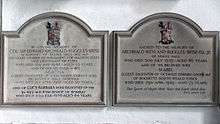Edward Ruggles-Brise
Lieutenant-Colonel Sir Edward Archibald Ruggles-Brise, 1st Baronet MC TD JP DL (19 September 1882 – 12 May 1942) was a British Conservative Party politician.

Early life
The son of Archibald Weyland Ruggles Brise (1857-1939), he was born at Westminster, London, in September 1882 and was educated at Eton College and Cambridge University. [1]
Career
Public service
He was magistrate and a Deputy Lieutenant for Essex from 1920.[2] In 1939 he was appointed as a Vice Lieutenant of Essex.[3]
Political career
He served as Member of Parliament (MP) for the Maldon constituency in Essex from 1922 until his death in 1942, with a brief interruption from 1923-24 when he narrowly lost the seat to his Labour opponent Valentine Crittall.
Ruggles-Brise was greatly interested in agricultural matters, serving on the Smallholdings Committee of Essex County Council and as Chairman of the Parliamentary Agricultural Committee.
Military career
From 1927, he commanded the 104th Essex Yeomanry Field Brigade, Royal Artillery of the Territorial Army.
Sport
Ruggles-Brise was a cricketer below first-class play level. He made one appearance making 27 runs at county level for Shropshire in 1904, while playing at club level for Ellesmere.[4]
Personal life
Ruggles-Brise was a landowner and was the owner of Spains Hall in Finchingfield, Essex, which had been inherited by his father, Archibald Weyland Ruggles-Brise, on the death of his own father, the politician Samuel Ruggles-Brise.
He married twice. Firstly to Agatha Gurney (1881–1937), daughter of John Henry Gurney Jr., a member of the Gurney family of Keswick Hall, Norfolk. Secondly to Lucy Barbara Pym MBE (1895–1979), daughter of Walter Ruthven Pym, Bishop of Bombay.
Following his death in May 1942 aged 59, he was succeeded in the baronetcy by his son Colonel Sir John Archibald Ruggles-Brise, 2nd Baronet.
Honours and decorations
In the 1935 Jubilee Honours List, he was made a Baronet, of Spains Hall, in Essex.[5][6]
References
- Percival, Tony (1999). Shropshire Cricketers 1844-1998. A.C.S. Publications, Nottingham. p. 24. ISBN 1-902171-17-9.Published under Association of Cricket Statisticians and Historians.
- Deputy Lieutenancy announced: "No. 31994". The London Gazette. 27 July 1920. p. 7867.
- Vice Lieutenancy announced: "No. 34627". The London Gazette. 19 May 1939. p. 3380.
- Shropshire Cricketers 1844-1998', pages 24,50.
- Baronetcy announced: "No. 34119". The London Gazette (Supplement). 28 December 1934. p. 1.
- Letters patent granted: "No. 34130". The London Gazette. 5 February 1935. pp. 837–838.
- Craig, F. W. S. (1983) [1969]. British parliamentary election results 1918-1949 (3rd ed.). Chichester: Parliamentary Research Services. ISBN 0-900178-06-X.
- Leigh Rayment's list of baronets
- Leigh Rayment's Historical List of MPs
External links
- Hansard 1803–2005: contributions in Parliament by Edward Ruggles-Brise
| Parliament of the United Kingdom | ||
|---|---|---|
| Preceded by Sir James Fortescue Flannery |
Member of Parliament for Maldon 1922–1923 |
Succeeded by Valentine Crittall |
| Preceded by Valentine Crittall |
Member of Parliament for Maldon 1924–1942 |
Succeeded by Tom Driberg |
| Baronetage of the United Kingdom | ||
| New creation | Baronet (of Spains Hall) 1935–1942 |
Succeeded by John Ruggles-Brise |